[Report] Graduate Student Workshop on Secularization, Religion and the State
On January 21, 2010, the University of Tokyo Center for Philosophy (UTCP) and the Asia Research Institute of the National University of Singapore (NUS) co-organized the “Graduate Workshop on Secularization, Religion and the State” held at NUS’s Asia Research Institute. Prof. Masashi Haneda and UTCP research fellows gave presentations.
[Opening Remarks]
At the opening, one of the organizers of this workshop, Professor Michael Feener (Asia Research Institute, Department of History, National University of Singapore) expressed his hopes that this workshop will lead to future cooperation between the University of Tokyo and the National University of Singapore. He also encouraged University of Tokyo students to apply for post-doctoral positions at the Asia Research Institute.
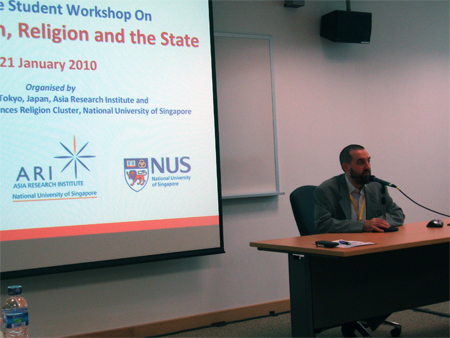
The co-organizer of this workshop, Professor Prasenjit Duara (Humanities and Social Sciences Research, National University of Singapore) said that he shared the views of Professor Haneda.
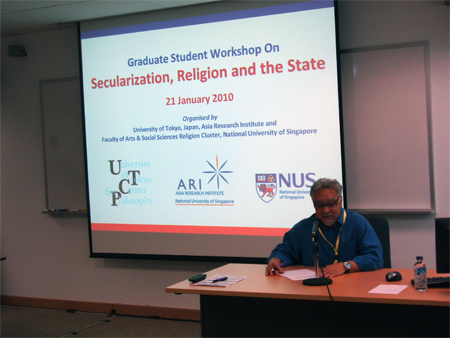
He was interested in how the concepts of religion and secularism, heavily influenced by the history of north western Europe, spread among places with different traditions through colonialism and the Protestantisation of the mainstream driving historical machinery. For example, in Chinese society, the world is not divided as it is in the Abrahamic religion in that the division is not between self and the other, but between those who worship heaven and those who worship other gods. In Abrahamic religion, particularly Protestantism, however, there is a concept of believers under God and faith is a very important organizing force. In 20th century Chinese society, there was no organized religion as in the West, but the state had called up the idea and use of secularism and religion, and organized religions so as to have a greater force over them. What was not organized as religion then became heterodoxy and superstition. Professor Duara concluded that vocabulary can give us a flawed conception of history but it can also move history in a direction that produces different trajectories. We need to carry out a fundamental clearing of these issues and understand this in several different layers in the Asian context.
(Reported by Noriko KANAHARA)
Next, Professor Masahi Haneda (UTCP) introduced our program (the “secularization, state and religion” program) and explained the importance of the workshop.
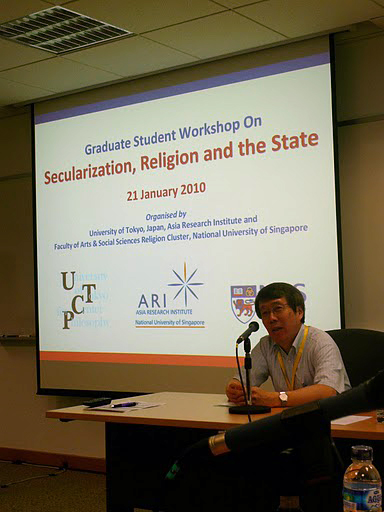
After looking back upon the activities undertaken in this program, such as workshops, lectures and seminars, Prof. Haneda pointed out the difficulties Japanese speakers face in considering and speaking on the problem of “secularization (Sezoku-ka)” in English, since the understanding of a word often reflects the background knowledge each speaker has. In Japan, it was in the late 19th century when the division between sezoku (世俗) and shukyo (宗教) was imported from Europe through the translation of the terms secular and religion. So when we Japanese speakers talk of the “secular”, we are thinking of sezoku, and when we talk of “religions”, we are thinking of shukyo. But the dichotomy between the secular and religion did not, however, always fit the historical background in Japan, and as a result, it often disagrees with the Japanese dichotomy between sezoku and shukyo even today. He mentioned that if we try to deepen the discussion on secularization and religion, we must be conscious of and overcome this disagreement. Professor Haneda then stated that the “secular / religion” division has overlapped, especially after 9.11, with the division between the West and the East and that it has led to discrimination against Muslims. He emphasized the importance of constructing “World History” so as to go beyond this division.
(Reported by: Akiyoshi OHNO)
Panel 1
Mariko Naito (The University of Tokyo, Centre for Philosophy) and Rodney Sebastian (National University of Singapore, Department of Sociology) were the presenters of panel one.
Naito’s presentation, “Rethinking the Dichotomy between Religious and Secular: The Emergence of Religion in Modern Japan,” compared Natsume Soseki’s Kokoro (1914) with Lafcadio Hearn’s Kokoro: Hints and Echoes of Japanese Inner Life (1896). According to Naito, Natsume Soseki considered the dichotomy of religion and the secular as one variation of the conflicts between individual and the state, heart and body, inner and external worlds, refusal to work and productive work, etc. In this perspective, religion was expected to be an alternative to the sphere of the nation-state and capitalism. Contrary to this, Hearn tried to overcome the dichotomy between religion and the secular by historicizing it with the introduction of another dichotomy: East/West.
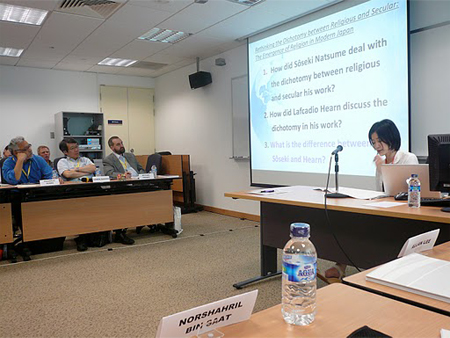
Sebastian’s paper, titled “Reviewing Singapore’s Secularization Model,” dealt with the state/religion relationship in Singapore. After a historical review of governmental politics toward different religions, he emphasized that the Singapore government has always stood for separation of church and state and the principal of religious neutrality. The politics ranged, however, from control to oppression, according to the attitudes of various religious organizations or social movements. Based on this analysis, Sebastian proposed a new model of religion management, in order to understand the behavior of the government which variously promotes, approves, monitors, or represses religions according to economic prosperity and a given religion’s influence on social order.
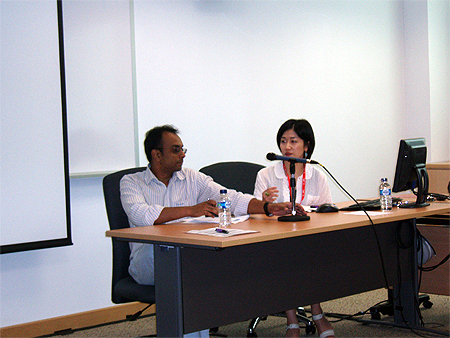
In the question and answer session that followed, some questions were raised for Naito in relation to studies of Japanese folklore by Yanagida Kunio and his relationship to nationalism. Prof. Prasenjit Duara pointed out that we can understand the historical meaning of Yanagida in terms of the discussed dichotomy of religion/secular. On the other hand, Sebastian added, concerning his argument, that religious balance is changing now given the growing number of Philippine immigrants to Singapore, etc.
(Reported by Shoko WATANABE)
Panel 2
Naofumi ABE (UTCP)
""Who Acknowledges his Rights ?": Prelude to the “Modernization" of the Judicial System in Mid-nineteenth Century Iran as seen in Persian Legal Documents"
Abe's presentation reconsidered Iran's Commercial Court and Mixed Tribunal System in the context of secularization. The Commercial Court and the Mixed Tribunal System were introduced in Asian and Middle Eastern countries in the nineteenth century in accordance with the unequal treaties concluded with European powers. Abe regarded the separation of religion and law as a process of secularization and laicite in the modern era. Focusing on the acknowledgement of private rights by the state, he discussed the introduction of the Commercial Court System in Iran as a prelude to the secularization of Iran.
Abe pointed out, however, that a great number of the plaintiffs or contractors who registered their rights and contracts in the Commercial Court were Caucasian Shi' and Iranian Christians. Thus, he insisted, it is important to analyze the process of various countries' "modernization" from a grass roots perspective.
Siriporn Dabphet(Graduate Student, Department of History, National University of Singapore)
"State and Religion: The Relationship and Changing of State and Religious Ideology in the Nineteenth-century Thailand"
Dabphet talked aboutdiscussed the changes of the Thai monarch’s image from its association with cosmological kingship to secular kingship in the context of Thai’s engagement with European modernity. Originally, the legitimacy of the Thai monarch was based on a religious ideology and was upheld as transcendental existence during the pre-modern period. In the modern period, westernized elites transformed the image of the Thai monarch into a modernized model compatible with European notions of kingship. Thus, until the middle of the nineteenth century, the Thai monarch was regarded as the patron of Buddhism and the father of the people.
Meanwhile, we see some pictures of the Thai king looking very relaxed and wearing simple clothes. These pictures show that the king himself was a living person and in this way they helped to cultivate an affinity for the king among the people.
In the discussion session, one of the participants indicated that the Thai case presents an important possibility for overcoming Euro-centric secularization theories. Another participant referred to the problem of “modernization theory” in Abe’s presentation. The presenter mentioned the importance of grass-roots viewpoints for overcoming the Euro-Asian dichotomy.
(Reported by Naofumi ABE)
Panel 3
Yoichi Isahaya (Ph.D student, Graduate School of Arts and Sciences)
“Vicissitudes of Nouruz / New Year’ Festival in the Iranian Context”
Firstly, Mr. Isahaya insisted on the importance of “Festival” for the investigation of the influence of modernization on “religion” and then he discussed the Nouruz Festival (New Year Festival) in Iran. According to the presenter, the Nouruz Festival, originating in the pre-Islamic era, was compatible with the Islamic context of the pre-modern period.
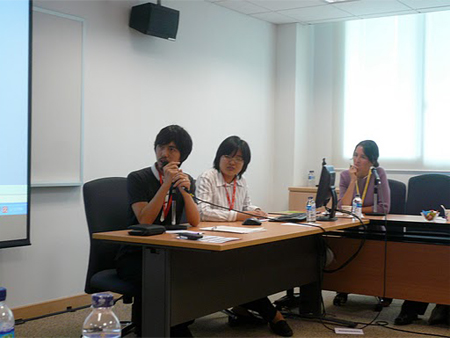
During the modern period, however, nationalistic secular intellectuals represented the Nouruz Festival as a secular festival and emphasized the disconnection between Islam and Nouruz. Thus, Isahaya called attention to the influence of modernity on representations of the Nouruz festival in nineteenth and twentieth century Iran.
Goh Yu Mei (Graduate Student, Department of Chinese Studies, National University of Singapore)
“Old Scriptures in New Language: A Study of Discourse in Modern Yuli Baochao”
Goh examined the “moral books” (善書) written since China’s Song dynasty. Both to read and to listen to the moral books, Goh explained, was regarded as meritorious and positively encouraged. The moral books themselves were distributed to ordinary people in the temples and inside the towns. Goh focused on the Yuli Baochao(玉暦寶鈔) and analyzed its external features and its text. She discussed the Chinese people’s emphasis on the importance of “merit-doing” since the twelfth century, from the standpoint of “religion”.
In the discussion, one of the participants, in reference to Goh’s presentation, referred to the resemblance between the religious principle of Chinese Christianity and the contents of “moral books” and asked about a possible connection between these two. Another participant observed that Isahaya’s logic might be applied to understand the relationship between the festival and modernity in other areas.
(Reported by Naofumi ABE)
Panel 4 (Chair Professor Michael Feener)
The first speaker of this panel, Noriko Kanahara (University of Tokyo Graduate School of Arts and Sciences), gave a talk titled “Japanese Religious Spirit in the Writings of Tadakazu Uoki during World War II” and analyzed the use of the “Japanese religious spirit” in Japanese theologian Tadakazu Uoki’s work during the war. Since the early 1930s, the Japanese government had disseminated a conception of “Japanese spirit”(日本精神) as a term which indicated Japanese citizens’ total loyalty to the emperor.
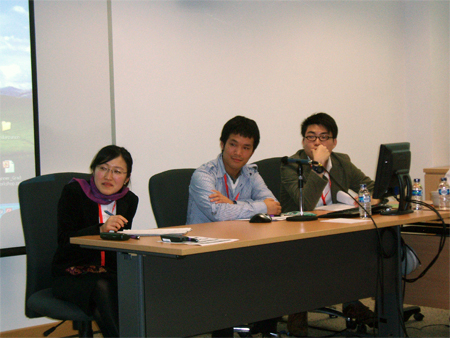
Under such a political climate, scholars of Christianity worked hard to reconcile Christianity with the emperor system, which acknowledged the emperor as the descendent of a Creator god. However, most ended up supporting the government’s war policy. Like his contemporaries, Uoki attempted to establish “Japanese Christianity.” In his most famous book, The Spiritual Tradition of Japanese Christianity (『日本基督教の精神的伝統』, 1941), Uoki wrote that the evocation of the Japanese religious spirit, which is the essence of the Japanese people, through its contact with Christian truth formulated Japanese Christianity.
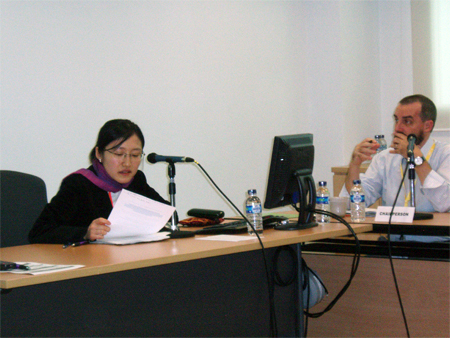
Critics of Uoki argued that his emphasis on Japanese Christianity did not emerge from his support for government policy, but from his academic interests in the effects of cultural factors in accepting Christianity. Kanahara, however, pointed out that Uoki’s argument on the regulation of revelation and the acceptance of Christian truth by the Japanese religious spirit negated the transcendence of the Christian God.
In addition, Uoki’s emphasis on the superiority of Japanese Christianity among all other forms of Christianity in East Asia paralleled the government discourse.
The second speaker, Tay Wei Leong (Department of History, National University of Singapore) gave a presentation titled “Kang You Wei, the Martin Luther of Confucianism: His Religious Nationalism and Modernity”. In his presentation, Leong discussed Confucian nationalism and modernity through the eyes of Kang You Wei. According to Leong, Kang tried to protect Confucian teachings from the corrupt Qing Dynasty and attempted to make it into a state religion. Leong pointed out that Kang’s use of Confucianism as a nationalist tool to oppose the dynasty reveals a form of religious modernity.
In other words, modernity takes shape through religious movements as well. Religious movements can change a secular society. In fact, Leong concluded, the secular and religious aspects of a society influence each other and, as with any individual, these aspects always coexist.
The third speaker was Chikara Uchida (University of Tokyo Graduate School of Arts and Sciences). In his presentation titled, “A Viewpoint of ‘Secularization, Religion and the State’: Japanese Historian AMINO Yoshihiko and his Concept of ‘People,’” Uchida analyzed the Japanese historian Yoshihiko Amino’s perception of “secularization, religion, and the state” through his concept of “people,” or jinmin in Japanese. According to Uchida, in his most famous book, Liberty and Peace in Medieval Japan (『無縁・公界・楽』, 1978), Amino considers religion in Medieval Japan as something that protects people from secular and despotic authority and gives them peace and liberty.
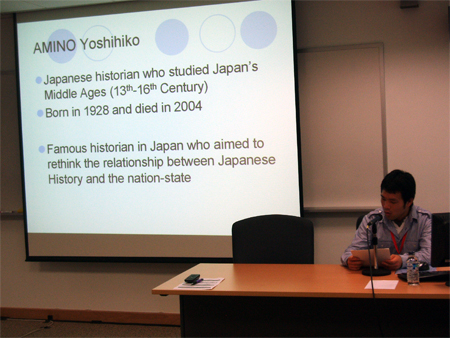
Amino was a Marxist but he had a positive image of religion, precisely because he saw it as being protective of people against the secular authority. In the Middle Ages, temples as representatives of liberty and peace were shelters for criminals and those who were not accepted by society. Uchida concluded that Amino’s work shows us that through the consideration of a third element, such as the concept of people, we can think of secularization, religion, and the state from a new perspective. In addition, the fact that Amino’s goal to establish a socialistic world affected the formulation of his concepts teaches us the importance of acknowledging the ideology of each scholar.
(Reported by Noriko KANAHARA)
Panel 5
In the fifth panel, two presentations dealt with the relation between religion and the state in connection with Algeria. One was on France, the suzerain, and the other was on Algeria, the colony.
First, Akiyoshi ONO (Department of Language and Information Sciences, UTCP RA) began his presentation with the “head scarf affair” in France occurring in 2003 and the Stasi report, which appeared after the affair. He discussed French intellectuals’ prejudice toward Muslims and sought its roots in the formation of the notion of human rights and the institution of laïcité in the 19th century. For this purpose, Ono took up the thought of Victor Hugo as an example. Hugo advocated tolerance and protection for the minorities in Europe and was deified as a protector of human rights; he also emphasized the importance of laïcité, the separation of church and state.
On the other hand, however, he affirmed colonization and religious segregation in Algeria through the typical theory of “the mission of civilization.”Ono mentioned two problems in Hugo’s humanism: firstly, since Hugo regarded the acceptance of European civilization as the definitive criteria for defining the “human being”, that is, those whose rights must be protected by law, as a result, Algerian Muslims, who were regarded as “barbaric”, were not seen as “human beings”. Secondly, though Hugo insisted on the laicization of education in France, he identified education in the colonies with Christianization, since he equated Christianity with European civilization, as opposed to Islam which he identified with barbarism.
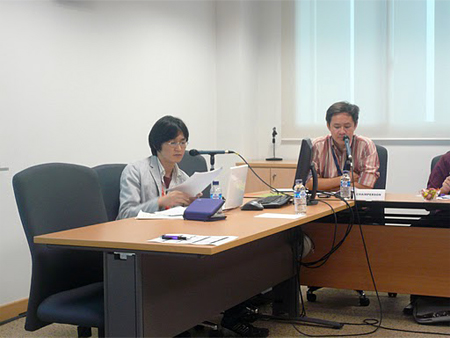
Next, Shoko WATANABE (Department of Area Studies, UTCP RA) read a paper on the differing notions of “politics” and “religion” among Nationalists and the Ulama in Algeria. While radical nationalists upheld religion as the ultimate end of their political struggle, the Ulama, though they often took an important role in political activities, defined themselves as ‘non-political’. Watanabe argued that the reason for this difference lies in their divergent understandings of “religion.” Nationalists regarded religion as a relationship between an individual and God, whereas the religious community of the Ulama (al-Umma) does not presuppose autonomous individuals. Watanabe pointed out that the Ulama considered itself to be the representative of the Umma and that for the Ulama “non-political” meant not to belong to any parties. The Ulama’s concern was to protect the independence of the Umma and they sought to position themselves as advisers to the government, with no adherence to a particular political party.
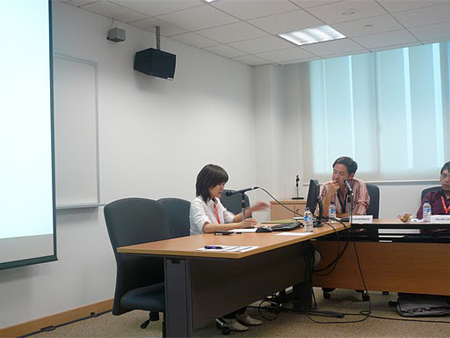
Comments and questions from the audience followed. One participant asked Ono whether there is no need to pay attention to other French colonies such as those of Southeastern Asia. Another pointed out that there were other motivations for colonization in the historical context. Professor Feener, commenting upon Watanabe’s presentation, suggested that she rethink the position of the Ulama from the standpoint of Islamic law.
(Reported by Akiyoshi OHNO)
Panel 6
The presenters of panel six were Norshahril Bin Saat (National University of Singapore, Department of Malay Studies) and Allan Lee (National University of Singapore, Department of Sociology).
In his paper “The State, Ulama and Religiosity: Rethinking the Islamization of Contemporary Malaysia”, Bin Saat discussed the role of the Ulama (Islamic scholars) in the phenomenon of “Islamization” in Malaysia. Citing the controversies around four Ulama who represent contemporary Malaysia, he emphasized the importance of the Ulama for Malaysian society in order to resist the government or to legitimate the religiosity of society. According to him, factors that determined the influence of the Ulama were group consensus, institutional independence, personal charisma, and historical/social environment.
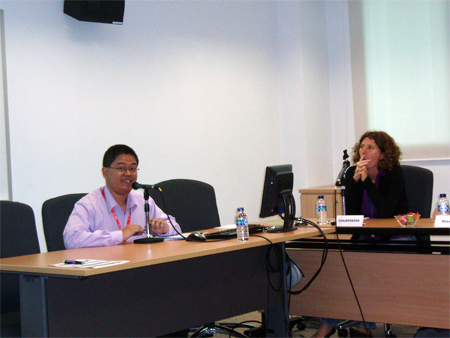
Lee’s presentation, titled “’The Advancement of Christ’s Kingdom’ in Two Cities: A Comparative Study of State-Religion Relations in Singapore and Malaysia,” concerned the activities of a Christian youth organization called the “Boy’s Brigade”. When we compare the programs of the Boy’s Brigade in the schools of Singapore and Malaysia, we find a striking difference between these two countries. The Boy’s Brigade emphasizes secular missions in Singapore, while it emphasizes Christian roots in Malaysia. According to Lee, this difference in accent corresponds to the difference of state ideology in both countries, that is to say, secularism for Singapore and religion (Islam) as state identity for Malaysia. The speaker concluded that in a secularized society, religious organizations adopt a strategy in which they take secular form in order to carry out their activities.
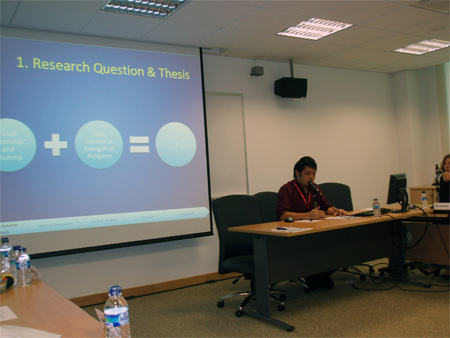
Prof. Michael Feener commented upon Bin Saat’s paper, pointing out that there is a kind of competition among the Ulama to obtain social support. The variation in philosophical backgrounds among the four Ulama (from Sufi to nationalist, from conservative to modernist) reflects this social differentiation. Addressing another question concerning the grammatological performance of the Boy’s Brigade, Lee cited Christian identity and morals.
(Reported by Shoko WATANABE)
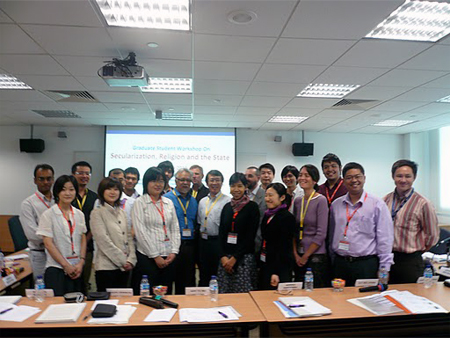
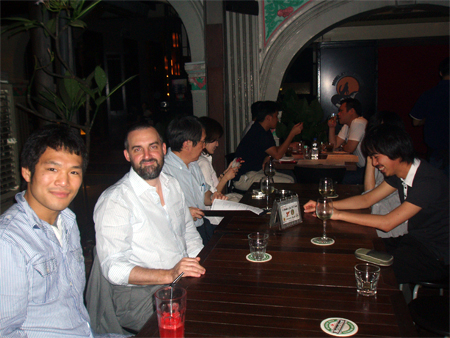
Lastly we would like to express our appreciation to Prof. Kobayashi (Director, UTCP) for his help to organize this workshop. We would also like to express our sincere gratitude to Prof. Haneda who has worked as the director of our program for two years.






